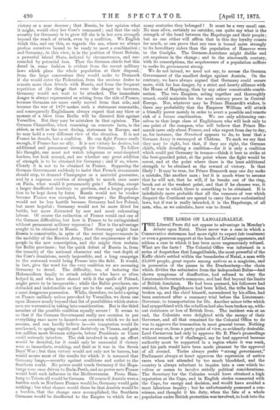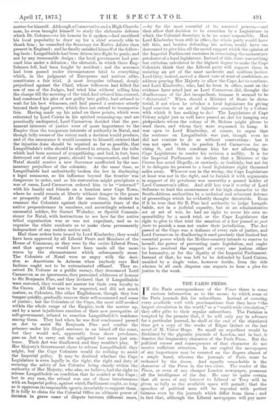THE LORDS ON LANGALIBALELE.
THE Liberal Peers did not appear to advantage in Monday's debate upon Natal. There never was a case in which a Conservative statesman had more tight to expect fair treatnaent or even a generous support at the hands of Liberal opponents and seldom a case in which it has been more ungenerously refused. What are the facts ? The Colonial Office was informed in a series of despatches that Langalibalele, the most powerful of the Kaffir chiefs settled within the boundaries of Natal, a man With 25,000 people, great repute among natives as a magician, and in possession of the passes in the Draehenberg—the chain which divides the submissive from the independent Zulus—had shown symptoms of disaffection, had refused to obey the Lieutenant-Governor's summons, and had fled beyond the limits of British dominion. He had been pursued, his followers had resisted, three Englishmen had been killed, the tribe had been broken up, and the chief himse]f, surrendered by his allies, had been sentenced after a summary trial before the Lieutenant- Governor, to transportation for life. Another minor tribe which had sympathised with the rebellion had also been broken up, with- out resistance or loss of British lives. The incident was at an end, the Colonists were delighted with the energy of their Governor, and all that remained for the Colonial Office to do was to approve the transaction in most general terms. Nothing was so easy or, from a party point of view, so evidently desirable. Lord Carnarvon had only to approve Sir B. Pine's proeeedings without remark, or if challenged, say he had approved because authority must be supported in a region where it was weak, and his path would have been made pleasant by the approval of all around. Tories always prefer "strong government," Parliament always at heart approves the repression of native races when not attended by too much bloodshed, and the country is always reluctant to inquire into a case which in- v'olves or seems to involve strictly political considerations. The Secretary for the Colonies would have obtained a high reputation at the Cape, and in English circles connected with the Cape, for energy and decision, and would have avoided a most laborious inquiry ; but he unfortunately possessed a con- science, and thought it his duty, when the fate of a whole population under Britith protection woe involved, to look into the
matter for himself. Although a Conservative and a High Church- man he even brought himself to study the elaborate defence which Dr. Colenso—to his honour be it spoken—had sacrificed his local popularity to draw up for a chief scarcely able to thank him ; he consulted the Secretary for Native Affairs then present in England ; and he finally satisfied himself of the follow- ing facts : Langalibalele had been driven into flight by panic, and not by any treasonable design ; the local government had pur- sued him under a delusion ; the skirmish, in which three Eng- lishmen fell, had been fought by accident ; and the sentence had been passed under circumstances fatal to everything which, in the judgment of Europeans and natives alike, constitutes a fair trial. A most irregular tribunal, deeply prejudiced against the Chief, whose followers had killed the son of one of the Judges, had tried him without telling him the charge till the morning of the trial, had refused him counsel, had construed his plea of not guilty into guilty, had refused to wait for his best witnesses, and had passed a sentence utterly beyond their legal power, which does not extend to transporta- tion. Having made up his mind on these points, which were reiterated by Lord Cairns in his spirited summing-up, and are practically undisputed, Lord Carnarvon decided that the per- manent interests of justice were of more importance to the Empire than the temporary interests of authority in Natal, and though fully aware of the outcry such a decision would produce, and of the annoyance it would occasion to himself, ordered that the injustice done should be repaired as far as possible, that Langralibalele's tribe should be allowed to return, that the tribe which had been accused of sympathising, and had, in fact, been destroyed out of sheer panic, should be compensated, and that Natal should receive a new Governor unaffected by the mo- mentary prejudices of the colonists. At the same time, as Langalibalele had undoubtedly broken the law in disobeying a legal summons, as his influence beyond the frontier was dangerous to order, and as his restoration might precipitate a war of races, Lord Carnarvon ordered him to be "interned" with his family and friends on a location near Cape Town, where he could remain at liberty without danger to the peace or prosperity of Natal. At the same time, he desired to reassure the Colonists against their reasonable fears of the native preponderance in numbers, and accordingly selected a successful soldier, Sir Garnet Wolseley, as Spacial Commis- sioner for Natal, with instructions to see how far the native tribal organisation was or was not expedient, and so to organise the white residents as to make them permanently independent of any sudden native raid.
Had these orders been issued by Lord Kimberley, they would have been approved by all Liberal Peers and Members of the House of Commons, as they were by the entire Liberal Press, and that approval would have been made all the more warm by the circumstances which subsequently arose. The Colonists of Natal were as angry with the deci- sion as Americans in Arizona when anybody says Red Indians ought not to be exterminated offhand. They re- ceived Dr. Colenso as a public enemy, they denounced Lord Carnarvon as an ignoramus, they presented addresses of honour to Sir Benjamin Pine, and they declared that if Langalibalele were restored, they would not answer for their own loyalty to the Crown. All that was to be expected, and did not much matter, as Colonists, like other Englishmen, though they lose temper quickly, gradually recover their self-command and sense of justice; but the Colonists of the Cape, the most stiff-necked within the whole range of the Empire, took the matter up, and by a most injudicious exertion of their new prerogative of self-government, refused to sanction Langalibalele's residence among them. They had when be was first condemned passed an Act to assist Sir Benjamin Pine and confine the prisoner under his illegal sentence in an island off the coast, but they would not, apparently from sheer petulance, pass an Act to carry out the mitigated but more just sen- tence. Their Act was disallowed, and they wouldn't play. If Her Majesty's Government chose to release Langalibalele they might, but the Cape Colonists would do nothing to assist the Imperial policy. It may be doubted whether the Cape Legislature is even legally in the right, the right and duty of securing the safety of her Colonies being clearly within the authority of Her Majesty, who also, we believe, had the right to release Langalibelele on condition that he resided at the Cape ; but in any case, the refusal was one of those interferences with an Imperial policy, against which Parliament ought, so long as it approves its responsible agents, invariably to support them. It is folly to claim for the Colonial Office an ultimate power of decision in grave cases of dispute between different races, —by far the most essential of its reserved powers,—and then allow that decision to be overriden by a Legislature to which the Colonial Secretary is in no sense responsible. Had Lord Kimberley been still in office, the whole party would have felt this, and besides defending his action, would have en- deavoured to give him all the moral support which the opinion of the Imperial Parliament exercises in overcoming the momentary petulance of a local legislature. Instead of this, there was nothing but criticism calculated in the highest degree to make the Cape Colonists think that the Liberal party will support them in resisting an act of the most moderate and cautious justice. Lord Grey. indeed, moved a direct vote of want of confidence, an address praying Her Majesty to allow the Cape Act to continue, and Lord Kimberley, who, had he been in office, must on the evidence have acted just as Lord Carnarvon did, thought the disallowance of the Act inexpedient, because it seemed to be "dictatorial." When should a Minister of State be dicta- torial, if not when he rebukes a local legislature for giving legal sanction to an act of injustice committed by a Colony with which it has nothing to do ? The Legislature of Cape Colony might just as well have passed an Act for hanging any pickpockets whom the colony of St. Helena might please to send there, and whom they were requested to hang. It was open to Lord Kimberley, of course, to argue that the sentence on Langalibelele was just, though even he did not venture to do so without reservations : but it was not open to him to pardon Lord Carnarvon for re- vising it, and then condemn him for not allowing the Cape Legislature to render his revision a nullity. It is for the Imperial Parliament to declare that a Minister of the Crown has acted illegally, or unwisely, or foolishly, but not for it to delegate its powers to a local legislature eight thousand miles away. Whoever was in the wrong, the Cape Legislature at least was not in the right, and to furnish it with arguments in support of its petulance was unworthy a passed holder of Lord Carnarvon's office. And still less was it worthy of Lord Selborne to lend the countenance of his high character to the South-African authorities by a technical and reluctant defence of proceedings which he evidently thought detestable. Even if it be true that Sir B. Pine had authority to judge Langali- balele, not in a judicial capacity, but as an administrative act or act of war, he had no right to cover his own re- sponsibility by a mock trial, or the Cape Legislature the right to give to that trial the sanction of a law passed er post facto to punish a man not under their jurisdiction. The Act passed at the Cape was a defiance of every rule of justice, and Lord Carnarvon in disallowing it used precisely that limited but essential power which the Mother-country intends to reserve to herself, the power of preventing caste legislation, and ought to have received the support of every one jealous either for humanity, or for the dignity of the Imperial Parliament. Instead of that, he was left to be defended by Lord Cairns, unaided by a single voice, however feeble, from the side whence in all such disputes one expects to hear a plea for justice to the weak.



































 Previous page
Previous page